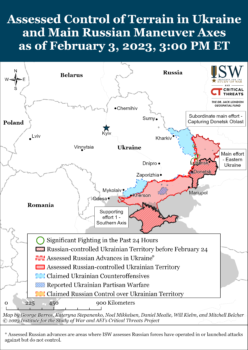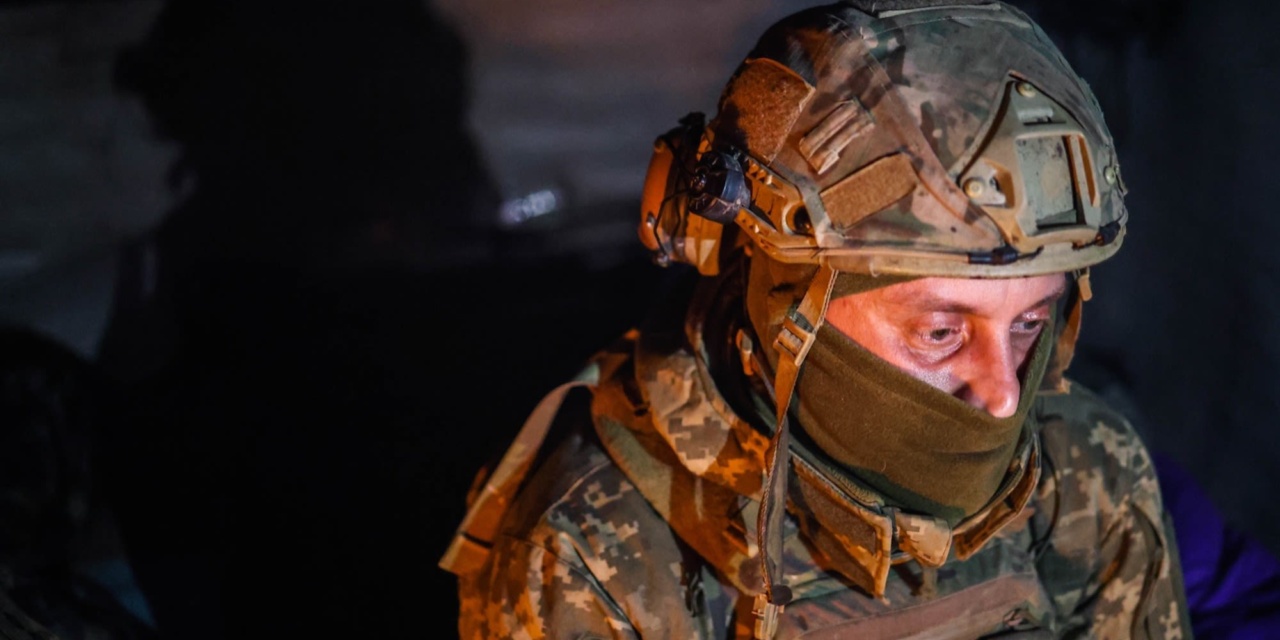A soldier on the frontline in the Donetsk region in eastern Ukraine (CNN)
EA on BBC: Biden Sets Up Campaign for a 2nd Term
Saturday’s Coverage: EU Toughens Russia Sanctions, US Confirms More Military Aid

Source: Institute for the Study of War
UPDATE 1839 GMT:
Iran and Russia are proceeding with plans for a new Russian factory to make at least 6,000 Iranian-designed drones, say “officials from a country aligned with the US“.
The sources said a high-level Iranian delegation flew to Russia in early January to visit the planned site and to work out details to start construction. The two countries are seeking faster drone which can evade Ukrainian air defenses.
Russia has used hundreds of Shahed “kamikaze” drones, since they were first delivered last summer, as well as missiles in attacks on Ukrainian energy infrastructure and other civilian sites.
While the assaults have caused damage — at one point knocking out half of the electricity grid — Kyiv’s air defenses now down almost all of the drones. Ukrainian and Western officials say Moscow is low on stocks as the attacks have diminishing effect.
The plans for a new factory inside plan were first revealed by Western officials in November.
UPDATE 1532 GMT:
Prime Minister Denys Shmyhal says about 280,000 residents in Odesa in southern Ukraine — 40% of consumers — remain without electricity after Saturday’s “technological accident” at a high-voltage electricity substation.
UPDATE 1517 GMT:
Russia lost almost 30% in revenues — an estimated $8 billion — from oil and gas exports in January, says International Energy Agency head Fatih Birol.
Europe’s dependence on Russian oil and gas has fallen from more than 50% before Vladimir Putin’s invasion of Ukraine to 27% in December.
A European Union cap of $60 per barrel on seaborne Russian crude oil came into force on December 5, and limits on Moscow’s oil products — $45 for basic such as fuel oil and $100 for premium such as diesel — take effect on Sunday.
UPDATE 1351 GMT:
Ukraine’s grain exports fell almost 20% in January amid Russia’s obstruction of shipments.
The Agriculture Ministry reported export of 5.5m metric tons of grain, compared with 6.8m metric tons in December.
A deal in July, brokered by the UN and Turkey, lifted Russia’s five-month blockade of Ukraine’s Black Sea ports. However, Moscow has been accused of delaying and blocking ships as they are being inspected.
Ukraine exported 39.2m tons of agricultural products, including 15.4m tons of corn and 9.7m tons of wheat, from July to January.
UPDATE 0959 GMT:
Scenes from this morning’s Russian attacks on Kharkiv in northeast Ukraine:
— Emine Dzheppar (@EmineDzheppar) February 5, 2023
Another morning, another missile. This time two on central Kharkiv at around 0820 AM. Five wounded confirmed. pic.twitter.com/DYOlP25DlQ
— Roland Oliphant (@RolandOliphant) February 5, 2023
UPDATE 0704 GMT:
“Flower protests” have spread to more than 60 cities in Russia.
The protests were sparked by the destruction of an apartment block in Dnipro in east-central Ukraine, killing 46 people, by a Russian missile strike on January 14.
Russians soon began putting flowers, toys, and pictures of the destroyed apartment block at the foot of the memorial to Ukrainian poet Lesya Ukrainka in Moscow, and to Ukrainian poet Taras Shevchenko in St. Petersburg.
The displays have continued despite threats of detention by security forces, and appeared in other parts of Russia.
In Siberia’s Novosibirsk in eastern Russia, a woman says, “It’s a statement against the war, not just mourning for the dead people in Dnipro. I couldn’t stay silent.”
A man in Khanty-Mansiisk in western Siberia says:
I decided to lay flowers at a local memorial to show that not all Russians lack compassion toward Ukrainians.
I was thinking about the Dnipro attack victims and what it must have been like to be under the rubble.
Residents in Kazan in southwest Russia have placed flowers, photos, and the sign ”Kazan is mourning” by a monument to victims of political repression. In Pskov in western Russia, people laid flowers and lit candles at a monument dedicated to mothers and children. In Vladikavkaz in the northern Caucasus, the memorial is a handful of red carnations and a child’s toy.
A young man in St. Petersburg says after laying flowers, “It’s not for the dead, it’s for the living. We need to know that we are not alone.”
UPDATE 0641 GMT:
The Wall Street Journal reports that China and Turkey are supplying military equipment to Russia.
The supplies include navigation equipment, radar and jamming technology, parts for fighter jets, and chips. Among the deliveries from Turkey are US products banned under American sanctions.
The Journal analyzed more than 84,000 shipments from the database of the Russian Federal Customs Service about the Chinese shipments. The documents record dates, suppliers, recipients, buyers, addresses, and product descriptions.
On August 31, Chinese State-owned defense company Poly Technologies sent navigation equipment for Mi-17 military transport helicopters to Russia’s sanctioned Rosoboronexport. Earlier in the month, Fujian Nanan Baofeng Electronic sent, through the Uzbekistan State defense company, a telescopic antenna for the RB-531BE radio electronic jamming system.
On October 24, Chinese State-owned AVIC International Holding sent parts for Su-35 fighter jets for $1.2 million to Russia’s Radioelectronic Technologies Concern, part of sanctioned Rostec.
China Taly Aviation Technologies sent parts for the 96L6E radar to sanctioned Almaz-Antey, which manufactures weapons for Russia’s air and missile defense — including S-300 and S-400 missiles being used in Russia’s aerial attacks on Ukraine.
The private Sinno Electronics, sanctioned by the US last year, organized more than 1,300 deliveries worth more than $2 million from April to October.
At least 13 Turkish companies have exported $18.5 million of plastic and rubber products and vehicles to at least 10 sanctioned Russian companies. At least three shipments included products made in the US.
From March to October, $15 million of American conveyors and elevators, power generators, circuit boards and other items were exported in violation of US sanctions.
UPDATE 0627 GMT:
The Zelenskiy Government is preparing sanctions on Viktor Yanukovych, the Russian-backed former President, and several of his ministers from 2010-2014.
On Saturday, President Volodymyr Zelenskiy signed a decree stripping the men of their citizenship. Davyd Arakhamiya, head of the Servant of the People Party in the Ukrainian Parliament, said their property will be confiscated.
“The next step will be to impose sanctions on them, freeze, and confiscate all their property, corporate rights, and other assets for the benefit of the state,” he explained.
Accused of corruption and blocking a closer Ukrainian relationship with the European Union, Yanukovych was forced from power by a popular uprising — the Maidan Revolution — in February 2014. Russia responded by seizing Crimea and sending in special forces to put proxies in charge of parts of eastern Ukraine.
Zelenskiy said in his nightly address to the nation, “Today, I signed the relevant documents to take another step to protect and cleanse our state from those on the side of the aggressor.”
ORIGINAL ENTRY: President Voldoymyr Zelenskiy has told the nation of a “tough” situation on the frontline in eastern Ukraine, as Russia seeks its first significant advance since July.
Zelenskiy said in his nightly address:
During 346 days of the war, I have often had to say that the situation on the frontline was fierce.
Now again is the time when the occupiers are throwing more and more of their forces to break through our defense. It is tough in Bakhmut, Vuhledar, Lyman, and other directions at the moment.
Since last summer, Russian forces have tried to seize territory in the western Donetsk region. The efforts have been redoubled after Ukraine’s successful counter-offensive in the northeast and south, with Vladimir Putin ordering a mass mobilization in September and the military turning to the mercenaries — including pardoned convicts — of the Wagner Group.
Despite waves of attacks resembling a “zombie movie”, the Russian offensive has only succeeded in taking the small town of Soledar, north of the city of Bakhmut.
However, analysts assess that conventional Russian forces, including specialized units, are being put on the frontline in an attempt to surround Bakhmut, a city of about 70,000 before Vladimir Putin’s invasion.
While acknowledging the intensity of the fighting, Zelenskiy concluded with a call for all Ukrainians to rally.
Now, as every day of these 346, the resilience of our soldiers decides everything. Our resilience!
It’s not about the efforts and plans of Russia. It’s about the courage and determination of our soldiers. The effectiveness and speed of all who support and help to support our defense forces. The attentiveness and persuasiveness of all those who defend Ukraine’s international positions. The strength and unity of our people – all those who work for our victory, and all those who support our heroes and the Ukrainian state.

